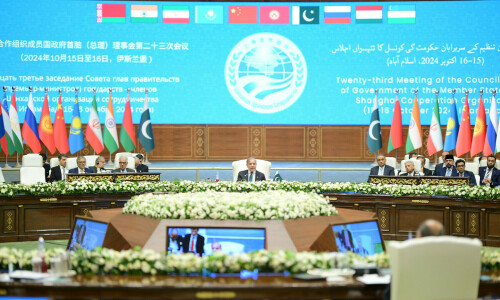China’s and Russia’s prime ministers, as well as senior officials from other member states and observers, were present. The meeting conveyed Pakistan’s readiness to play a leading role in multilateral organizations and demonstrated Pakistan’s once-in-a-generation willingness to engage in business. The summit’s joint communiqué summarized the event’s major themes, which included commerce, the environment, cultural exchanges, and other topics.
Altogether, the report reaffirmed endeavors to set up the SCO Advancement Bank and increment “the portion of public monetary forms in common repayments”. The “unilateral application of sanctions is incompatible” with international law was also noted in the document. All of these seem to be veiled jabs at the West, which has used the dollar and sanctions as weapons against geopolitical foes like Russia and Iran, both members of the SCO. “Traditional values and cultural and civilisational diversity” were also emphasized in the statement.
Prime Minister Shehbaz Sharif, on the other hand, referred to climate change as an “existential crisis” while discussing the need for stability in Afghanistan, which, despite being a member of the SCO, has not attended the group’s meetings since the Taliban took over in 2021. Additionally, Mr. Sharif stated that the “ongoing genocide in Gaza” cannot be ignored.
Given Pakistan’s unique challenges over the past few years, including security concerns, financial difficulties, and internal political turmoil, organizing the event and ensuring the safety of such a large number of foreign dignitaries was no easy task, even though states routinely host such multilateral events. In the joint communiqué, fellow SCO states acknowledged Pakistan’s efforts and noted that the summit was held in a “constructive and friendly atmosphere.”
The SCO’s vision, particularly with regard to a common bank, currency swaps, seamless regional connectivity, etc., will require time and a lot of effort to become a reality from this point forward. After all, it is a significant challenge for the bureaucracies of all ten states, each of which has a different form of government, to collaborate on these common objectives. Be that as it may, while the targets might be challenging to accomplish, they are certainly feasible. From Pakistan’s perspective, economic expansion necessitates regional connectivity with its Eurasian neighbors. In the region, the nation cannot remain isolated.



